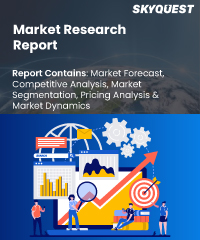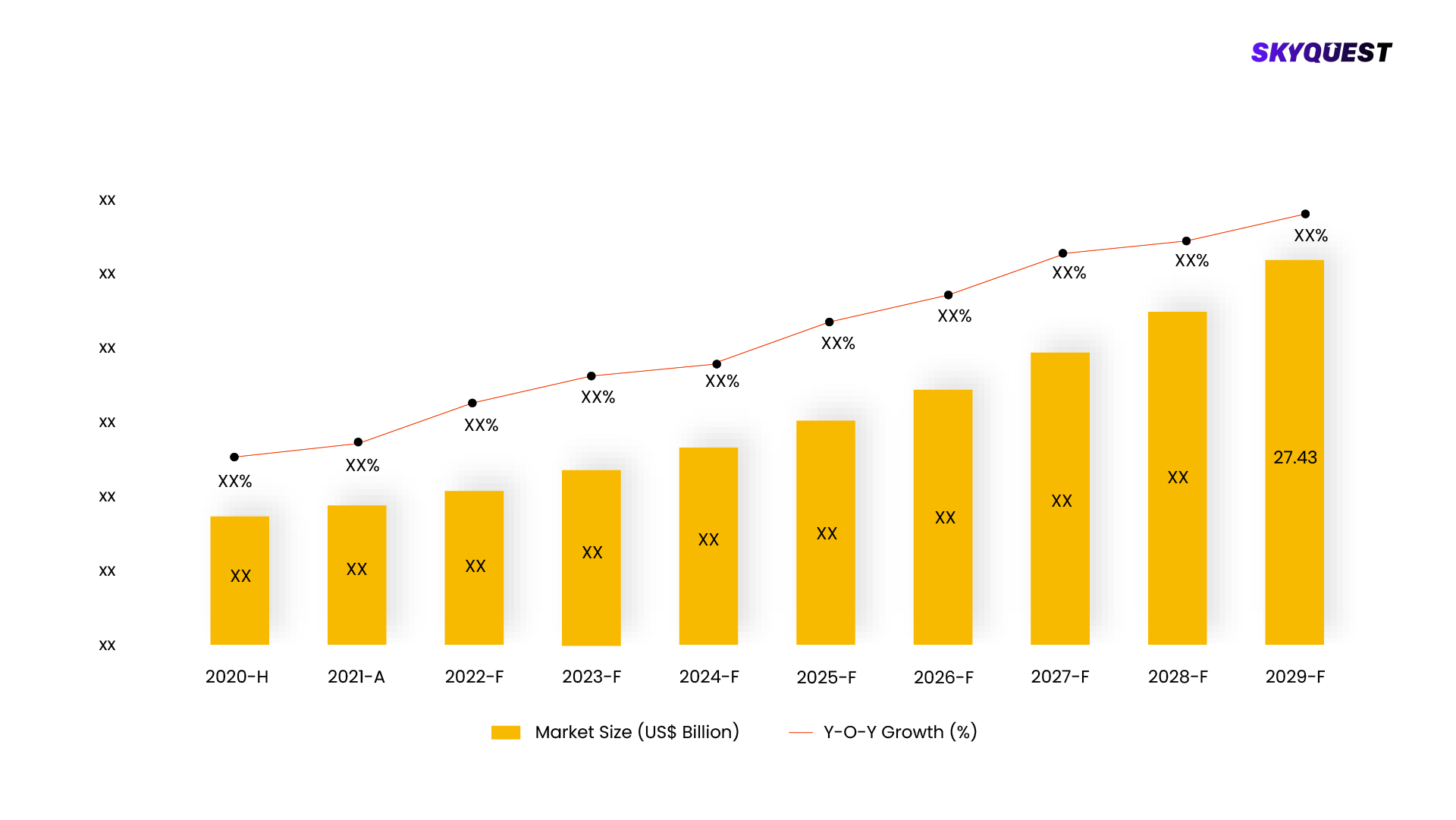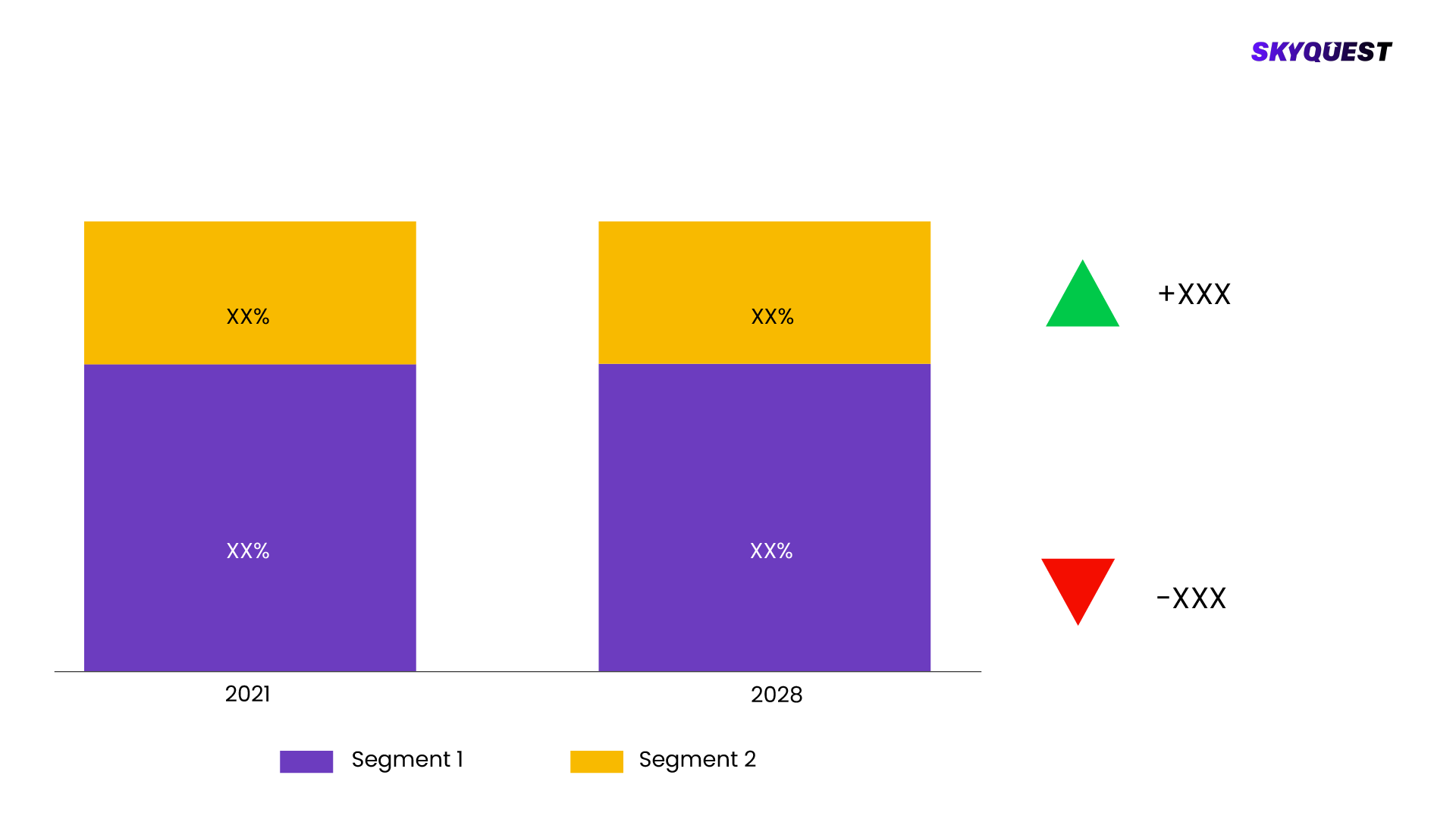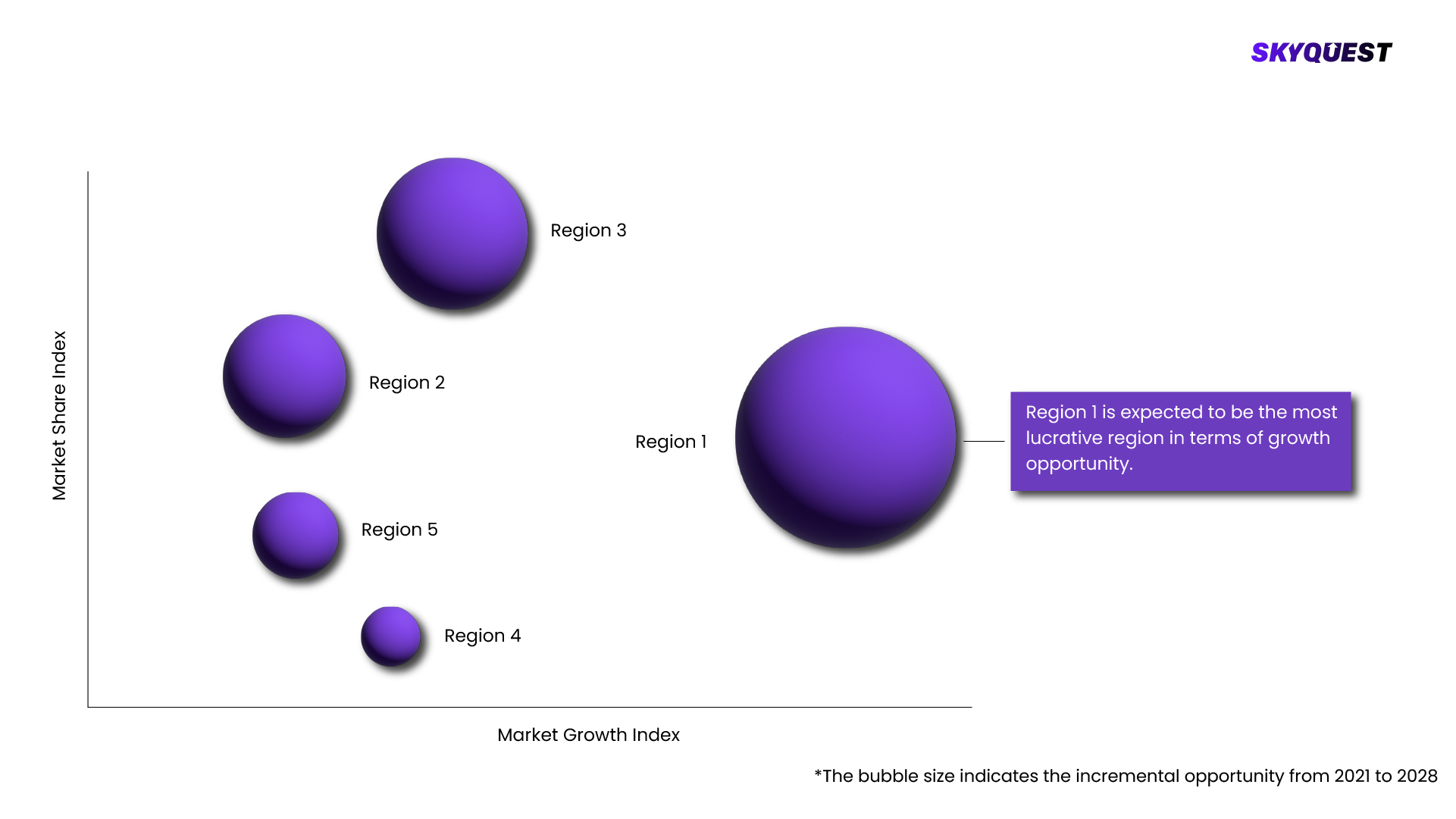
Report ID: UCMIG35I2237

Report ID: UCMIG35I2237
sales@skyquestt.com
USA +1 351-333-4748

Report ID:
UCMIG35I2237 |
Region:
Global |
Published Date: Upcoming |
Pages:
165
|Tables:
0
|Figures:
0



Commencing at an estimation of USD 1.16 billion in 2018, the global market for myasthenia gravis (MG) treatment is poised to undergo substantial expansion, projected to uphold an impressive Compound Annual Growth Rate (CAGR) of 7.5% throughout the forecast period. This ascending trajectory is underpinned by a convergence of pivotal factors. Chief among them is the escalating uptake of immunotherapies, a trend bolstered by the approval of promising drugs that offer renewed optimism for MG patients. Furthermore, the emergence of biologics in the treatment landscape has spurred innovative avenues for managing this condition. Adding to this dynamic landscape is the growing awareness surrounding rare diseases, including myasthenia gravis, which collectively coalesce to drive the market's evolution, enabling improved care for affected individuals worldwide.

This report is being written to illustrate the market opportunity by region and by segments, indicating opportunity areas for the vendors to tap upon. To estimate the opportunity, it was very important to understand the current market scenario and the way it will grow in future.
Production and consumption patterns are being carefully compared to forecast the market. Other factors considered to forecast the market are the growth of the adjacent market, revenue growth of the key market vendors, scenario-based analysis, and market segment growth.
The market size was determined by estimating the market through a top-down and bottom-up approach, which was further validated with industry interviews. Considering the nature of the market we derived the Pharmaceuticals by segment aggregation, the contribution of the Pharmaceuticals in Pharmaceuticals, Biotechnology & Life Sciences and vendor share.
To determine the growth of the market factors such as drivers, trends, restraints, and opportunities were identified, and the impact of these factors was analyzed to determine the market growth. To understand the market growth in detail, we have analyzed the year-on-year growth of the market. Also, historic growth rates were compared to determine growth patterns.
The Myasthenia Gravis Treatment Market is segmented by Treatment (Revenue, USD Million, 2015 - 2026), End-Use (Revenue, USD Million, 2015 - 2026), Regional (Revenue, USD Million, 2015 - 2026). We are analyzing the market of these segments to identify which segment is the largest now and in the future, which segment has the highest growth rate, and the segment which offers the opportunity in the future.

Myasthenia Gravis Treatment Market is being analyzed by North America, Europe, Asia-Pacific (APAC), Latin America (LATAM), Middle East & Africa (MEA) regions. Key countries including the U.S., Canada, Germany, France, UK, Italy, Spain, China, India, Japan, Brazil, GCC Countries, and South Africa among others were analyzed considering various micro and macro trends.

SkyQuest's expert analysts have conducted a risk analysis to understand the impact of external extremities on Myasthenia Gravis Treatment Market. We analyzed how geopolitical influence, natural disasters, climate change, legal scenario, economic impact, trade & economic policies, social & ethnic concerns, and demographic changes might affect Myasthenia Gravis Treatment Market's supply chain, distribution, and total revenue growth.
To understand the competitive landscape, we are analyzing key Myasthenia Gravis Treatment Market vendors in the market. To understand the competitive rivalry, we are comparing the revenue, expenses, resources, product portfolio, region coverage, market share, key initiatives, product launches, and any news related to the Myasthenia Gravis Treatment Market.
To validate our hypothesis and validate our findings on the market ecosystem, we are also conducting a detailed porter's five forces analysis. Competitive Rivalry, Supplier Power, Buyer Power, Threat of Substitution, and Threat of New Entry each force is analyzed by various parameters governing those forces.
The Myasthenia Gravis Treatment Market is being analyzed by SkyQuest's analysts with the help of 20+ scheduled Primary interviews from both the demand and supply sides. We have already invested more than 250 hours on this report and are still refining our date to provide authenticated data to your readers and clients. Exhaustive primary and secondary research is conducted to collect information on the market, peer market, and parent market.
Our cross-industry experts and revenue-impact consultants at SkyQuest enable our clients to convert market intelligence into actionable, quantifiable results through personalized engagement.
| Report Attribute | Details |
|---|---|
| The base year for estimation | 2021 |
| Historical data | 2016 – 2022 |
| Forecast period | 2022 – 2028 |
| Report coverage | Revenue forecast, volume forecast, company ranking, competitive landscape, growth factors, and trends, Pricing Analysis |
| Segments covered |
|
| Regional scope | North America, Europe, Asia-Pacific (APAC), Latin America (LATAM), Middle East & Africa (MEA) |
| Country scope | U.S., Canada, Germany, France, UK, Italy, Spain, China, India, Japan, Brazil, GCC Countries, South Africa |
| Key companies profiled |
|
| Customization scope | Free report customization (15% Free customization) with purchase. Addition or alteration to country, regional & segment scope. |
| Pricing and purchase options | Reap the benefits of customized purchase options to fit your specific research requirements. |
Table Of Content
Executive Summary
Market overview
Parent Market Analysis
Market overview
Market size
KEY MARKET INSIGHTS
COVID IMPACT
MARKET DYNAMICS & OUTLOOK
Market Size by Region
KEY COMPANY PROFILES
Methodology
For the Myasthenia Gravis Treatment Market, our research methodology involved a mixture of primary and secondary data sources. Key steps involved in the research process are listed below:
1. Information Procurement: This stage involved the procurement of Market data or related information via primary and secondary sources. The various secondary sources used included various company websites, annual reports, trade databases, and paid databases such as Hoover's, Bloomberg Business, Factiva, and Avention. Our team did 45 primary interactions Globally which included several stakeholders such as manufacturers, customers, key opinion leaders, etc. Overall, information procurement was one of the most extensive stages in our research process.
2. Information Analysis: This step involved triangulation of data through bottom-up and top-down approaches to estimate and validate the total size and future estimate of the Myasthenia Gravis Treatment Market.
3. Report Formulation: The final step entailed the placement of data points in appropriate Market spaces in an attempt to deduce viable conclusions.
4. Validation & Publishing: Validation is the most important step in the process. Validation & re-validation via an intricately designed process helped us finalize data points to be used for final calculations. The final Market estimates and forecasts were then aligned and sent to our panel of industry experts for validation of data. Once the validation was done the report was sent to our Quality Assurance team to ensure adherence to style guides, consistency & design.
Analyst Support
Customization Options
With the given market data, our dedicated team of analysts can offer you the following customization options are available for the Myasthenia Gravis Treatment Market:
Product Analysis: Product matrix, which offers a detailed comparison of the product portfolio of companies.
Regional Analysis: Further analysis of the Myasthenia Gravis Treatment Market for additional countries.
Competitive Analysis: Detailed analysis and profiling of additional Market players & comparative analysis of competitive products.
Go to Market Strategy: Find the high-growth channels to invest your marketing efforts and increase your customer base.
Innovation Mapping: Identify racial solutions and innovation, connected to deep ecosystems of innovators, start-ups, academics, and strategic partners.
Category Intelligence: Customized intelligence that is relevant to their supply Markets will enable them to make smarter sourcing decisions and improve their category management.
Public Company Transcript Analysis: To improve the investment performance by generating new alpha and making better-informed decisions.
Social Media Listening: To analyze the conversations and trends happening not just around your brand, but around your industry as a whole, and use those insights to make better Marketing decisions.
REQUEST FOR SAMPLE
The market for Myasthenia Gravis Treatment was estimated to be valued at US$ XX Mn in 2021.
The Myasthenia Gravis Treatment Market is estimated to grow at a CAGR of XX% by 2028.
The Myasthenia Gravis Treatment Market is segmented on the basis of Treatment (Revenue, USD Million, 2015 - 2026), End-Use (Revenue, USD Million, 2015 - 2026), Regional (Revenue, USD Million, 2015 - 2026).
Based on region, the Myasthenia Gravis Treatment Market is segmented into North America, Europe, Asia Pacific, Middle East & Africa and Latin America.
The key players operating in the Myasthenia Gravis Treatment Market are rview , The myasthenia gravis (MG) treatment market size was estimated at USD 1.16 billion in 2018 and is anticipated to grow at a CAGR of 7.5% over the forecast period. The key factors driving this market include the rising adoption of immunotherapies, the approval of promising drugs, the emergence of biologics, and increasing awareness of rare diseases. , Myasthenia gravis (MG) is a chronic, progressive, and rare neuromuscular disorder that is characterized by weakness of the head, limb, spinal, eye, and respiratory muscles. In this autoimmune disorder, antibodies are produced against the acetylcholine receptor (AchR) that impedes the normal transmission of electrical signals from nerves to muscles. , According to the National Organization for Rare Disorders (NORD), in the U.S. around 14-40 per 100,000 individuals suffer from myasthenia gravis. Reports suggest that the frequency of the disorder is on the rise over the last several decades. This can be attributed to the better identification of patients and the increasing prevalence of autoimmune disorders in general across the world. , Myasthenia gravis occurs more frequently in females than in males, and although symptoms may appear at any age, its onset usually peaks in men in their 50s or 60s and women during their 20s or 30s. There is no proven cure for myasthenia gravis, however, patients can be treated with medications and surgery for the management of the symptoms. , At present, research is focused on a better understanding of the specifics of the autoimmune problems associated with MG and improving their diagnosis and treatment. Additionally, the market is observing a paradigm shift in the area of research from suppressing the immune system to rebalancing it. Another important area of research is the physiology of the neuromuscular junction (NMJ), aimed at improvement in its function regardless of probable immune system attacks. , Treatment Insights , Among the treatments, medication held the largest market share and is expected to maintain its leading position through the forecast period. This is because medications can dramatically inhibit the immune system and largely manage the associated symptoms. Medications include immunotherapies such as Soliris (eculizumab), corticosteroids, and immunosuppressive drugs such as Prograf (tacrolimus) and Neoral/Sandimmune (cyclosporine). The other major treatment alternative, surgery, is the most invasive in nature and usually involves a thymectomy (thymus removal). The thymus deteriorates with age (thymic involution), however complete loss of the thymus in such manner will significantly weaken a patient’s immune system. , The myasthenia gravis treatment market is witnessing an upsurge in the number of pipeline studies for drug development that is expected to drive the market. Recently, Alexion Pharmaceuticals’ Soliris (eculizumab) received approval by both the U.S. FDA and the European Commission for the treatment of adult patients with generalized myasthenia gravis who are anti-AchR antibody-positive. Soliris is the first and only complement inhibitor approved for this disorder. The increasing use of monoclonal antibodies and immunosuppressants is aimed at the reduction of lifelong exposure to corticosteroids and improvement in long-term results. , End-Use Insights , Based on end-use, the myasthenia gravis treatment market has been segmented into hospitals, clinics, and others. The hospital segment held the largest market share in 2018 and is expected to grow at the highest CAGR over the forecast period. This can be attributed to access to a large patient pool and high demand for advanced equipment for MG treatment in hospital settings. There has been an increase in the number of patient visits for diagnosis and treatment of MG due to the availability of a broad range of treatment options in such facilities. Furthermore, one of the major factors contributing to its large share is the increased investment in state-of-the-art healthcare infrastructures. , The clinic segment held the second-largest share in 2018 and is expected to retain the position through the forecast period. Currently, with the growing need for specialized treatments, a lot of patients are preferring specialty clinics for rapid diagnosis and effective MG treatment. A large segment of the end-users also depends on eCommerce channels for obtaining therapeutics for myasthenia gravis. These segments are significantly contributing to the growth of myasthenia gravis treatment market. , Regional Insights , Among all the regions, North America had the largest market share in 2018 and is projected to lead the market over the forecast period. This can be attributed to the high adoption of immunotherapies and monoclonal antibodies, increasing healthcare expenditure, presence of established research and development facilities, and favorable reimbursement scenario. , Asia Pacific is anticipated to grow at the fastest CAGR through the forecast period due to the increase in revenue generation from medications such as immunosuppressants and monoclonal antibodies in this region. Other factors propelling the growth are the initiatives associated with increasing investments in the healthcare sector by the governments and manufacturers in the region. , Myasthenia Gravis Treatment Market Share Insights , Alexion Pharmaceuticals and Astellas Pharma hold the largest market shares due to the strong sales of their flagship products including Soliris and Prograf. , However, generic competition is a major hindrance to market growth, due to patent loss of several marketed products and the availability of low-priced substitutes to branded drugs in the market. To gain an advantage against competitors, companies are adopting strategies such as expansion in the emerging countries, new product development, spreading awareness, and getting into collaborations. , KEY MARKET SEGMENTS, By Treatment (Revenue, USD Million, 2015 - 2026) , Medication , Surgery , Others , By End-Use (Revenue, USD Million, 2015 - 2026) , Hospitals , Clinics , Others , By Regional (Revenue, USD Million, 2015 - 2026) , North America , The U.S. , Canada , Europe , UK , Germany , France , Italy , Spain , Russia , Asia Pacific , Japan , China , India , South Korea , Singapore , Australia , Latin America , Brazil , Mexico , Argentina , Middle East & Africa , South Africa , Saudi Arabia , UAE , KEY MARKET PLAYERS, Alexion Pharmaceutical Inc. , Grifols SA , Avadel Pharmaceuticals plc , Novartis AG , Pfizer, Inc. , AbbVie Inc. , F. Hoffmann-La Roche Ltd. , GlaxoSmithKline plc , Bausch Health Companies Inc. , Shire plc.".
Want to customize this report? This report can be personalized according to your needs. Our analysts and industry experts will work directly with you to understand your requirements and provide you with customized data in a short amount of time. We offer $1000 worth of FREE customization at the time of purchase.
Feedback From Our Clients